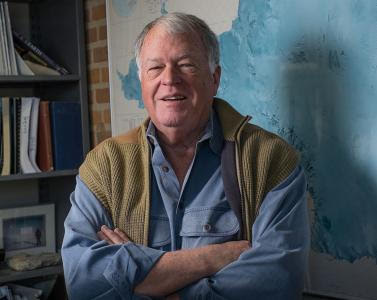HGS General Dinner Meeting
Monday, September 16, 2024
Social Hour starts at 5:30pm, Dinner at 6:30, Talk at 7:15 pm
Cost: $65 Pre-registered members; Student $35.00; $75 non-members & ALL walk-ups
To guarantee a seat, you must pre-register on the HGS website and pay with a credit card. You may walk up and pay at the door if extra seats are available. Please cancel by phone or email within 24 hours before the event for a refund. Online & pre-registration closes Sunday, September 15.
Holocene versus Historical Response of the Gulf Coast to Sea-Level Rise and Climate Change: From Coastal Stability to Rapid Demise
Speaker: John Anderson, Rice University
Climate Change has rapidly forced the Earth into conditions that have not existed
historically, leaving us without analogs for current and future change. The historical
acceleration of sea-level rise has resulted in rates that have not occurred for more than 7,500 years, a period of rapid change. However, current rates of coastal change are exacerbated by natural and anthropogenic influences. This talk summarizes three decades of research focused on how different coastal environments responded to sea-level rise and changes in climate during the Holocene and how these changes compare to those occurring today. NOAA models show extensive wetlands loss by the year 2050, especially in Louisiana and Texas, with most of the Mississippi Delta and Louisiana-east Texas Chenier Plain inundated. Gulf Coast estuaries are also experiencing widespread drowning of their bayhead deltas, vital components of estuarine ecosystems. This is a stark reversal of the growth of these coastal settings during the last four thousand years. Likewise, barrier islands, peninsulas, and mainland beaches are experiencing rapid erosion following a long history of stability and growth.
Our studies show that current rates of coastal change are similar to or
exceed those that occurred during the early Holocene. This is largely due to accelerated sea
level rise and human alteration of sediment supply and dispersal systems. The best approach to slowing the rate of coastal change is large-scale sediment nourishment. This calls for large volumes of sediment and will require large-scale coastal sediment budget analyses. Unfortunately, Gulf Coast states have been slow to recognize the problem, and widespread coastal change is inevitable and irreversible.

About the Speaker:
Dr. John Anderson is the W. Maurice Ewing Professor of Oceanography-Emeritus at Rice
University, where he was a faculty member for 43 years before his retirement. John’s
research focuses on the history of the Antarctic Ice Sheet and the evolution of the Gulf
Coast in response to sea-level rise and climate change. This research has included 24
marine geological expeditions to Antarctica and the acquisition of an extensive collection of
data and scientific publications on the Gulf Coast. He has authored two books Antarctic
Marine Geology (Cambridge University Press) and The Formation and Future of the Upper
Texas Coats (Texas A&M Press), and co-edited five books, including a 2022 Geological
Society of America Memoir entitled “Holocene Evolution of the Western Louisiana–Texas
Coast, USA: Response to Sea-Level Rise and Climate Change”. He has published over 280
peer-reviewed papers and mentored 70 graduate students, a number of them currently
engaged in Antarctic and coastal research. Dr. Anderson received the 1992 Gulf Coast
Association of Geological Society (GCAGS) Outstanding Educator Award, the 2019 Doris
Curtis Outstanding Educator Award, and the 2007 Shepard Award from the Society for
Sedimentary Research. His other awards include the Rice University Graduate Teaching
Award and the Rice University Presidential Mentoring Award. He has served on numerous
scientific committees and advisory boards, is a fellow of the Geological Society of America,
and was the past president of the Society for Sedimentary Research.



